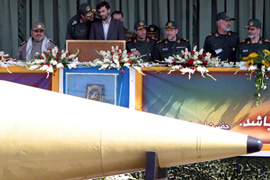Iran vows no nuclear retreat
President Ahmadinejad says the Islamic republic will defend itself if attacked.

Dealing with Iran, which a number of countries suspect is developing a nuclear bomb, has become an issue in the November US presidential election campaign.
Democrat Barack Obama and Republican John McCain have sparred over the issue, with Obama stating a readiness to talk to Ahmadinejad and other US adversaries if elected.
Ahmadinejad has previously expressed willingness to hold direct talks with George Bush, the US president.
But Washington says Tehran must first suspend uranium enrichment before the two sides can sit down and talk about nuclear and other issues.
Major powers have offered a package of trade and other incentives if the Islamic Republic stops enriching uranium, a process the West believes Iran is seeking to master to build nuclear warheads.
Tehran denies the charge.
Sanction seekers
The US, UK and France this week vowed to seek harsher sanctions on Tehran over its defiance of UN demands for full disclosure and a halt to enrichment, which can
have both civilian and military purposes.
| IN VIDEO |
 US Navy boat presence in Gulf at five year high |
Their calls came after the UN’s International Atomic Energy Agency said in a report on Monday that Iranian stonewalling had brought to a standstill its investigation into whether Iran had covertly researched ways to make an atom bomb.
Ahmadinejad said the IAEA report had confirmed the peaceful nature of Iran’s nuclear work and that Tehran had co-operated with the Vienna-based UN agency with “full transparency”.
But he also said the IAEA had no mandate to consider Western intelligence, which alleges that Iran had linked projects to process uranium, test high explosives and modify a missile cone in a way suitable for a nuclear warhead.
Iran, which has repeatedly denied the allegations, says its nuclear activities are only for generating electricity.
Iran has withstood three rounds of limited UN sanctions imposed so far and may count on Russia, at odds with Western powers over the conflict with Georgia, to hold up harsh action by the UN Security Council, analysts say.
Military action
The United States and Israel have not ruled out military action if diplomacy fails to resolve the nuclear standoff.
 |
|
The Shahab-3 missile reportedly has a range that could reach Israel [AFP]
|
Ahmadinejad, who again predicted the demise of Israel, said Iran would defend itself if attacked but that the Jewish state was in “a weak position to launch attacks against any other country,” Press TV reported.
A senior adviser to Iran’s supreme leader warned on Thursday that in the event of war, all ships passing through the oil-rich Gulf region would be within the reach of Iran’s missiles, a government newspaper reported on Thursday.
Iran said it could respond to any military attack by closing the strait at the southern end of the Gulf through which about 40 per cent of the world’s traded oil passes.
The US, whose naval Fifth Fleet is based in the Gulf state of Bahrain, has vowed to keep shipping lanes opened.
“At a time of war no ship can pass through the region of the Persian Gulf without being in the reach of the Revolutionary Guards’ coast-to-sea missiles,” Yahya Rahim-Safavi, a senior military adviser of Supreme Leader Ayatollah Ali Khamenei, was quoted by the Iran daily as saying.
On Sunday Iran will parade its Shahab missiles, Iranian media also reported. The Shahab-3 missile reportedly has a range that could reach Israel.
“By staging this parade, we are ready to tell the world … that we are totally ready to defend our Islamic system and country,” the Fars news agency quoted the commander in charge of organising the parade, as saying.
Sunday’s parade marks the start of the 1980-88 Iran-Iraq war.